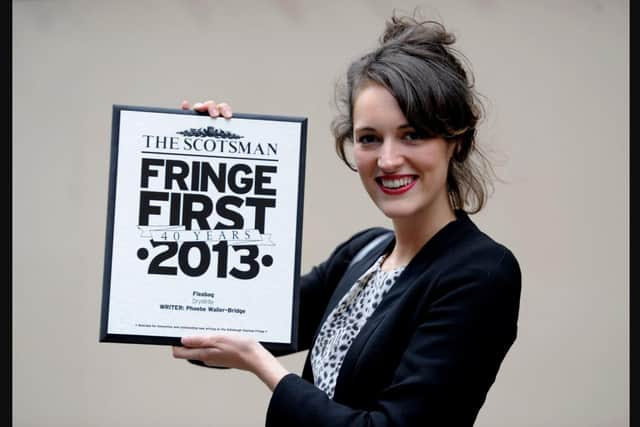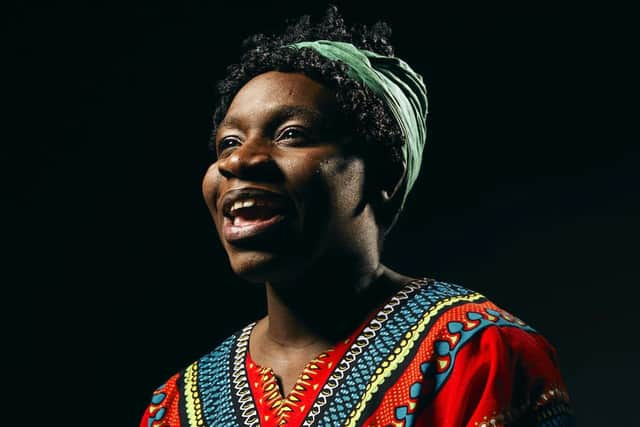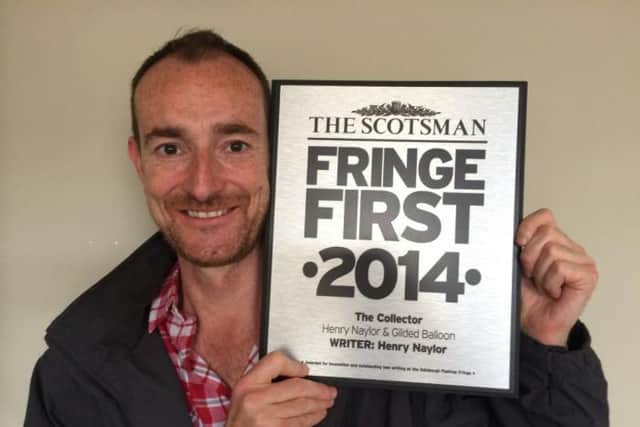50 years of Scotsman Fringe Firsts: celebrating the festival's longest-running awards
IT WAS just another one-woman show in a dark room in the depths of the Underbelly. Just another artist trying to pull in an audience in one of the most competitive environments on earth. While the word on the street in 2013 was good about Phoebe Waller-Bridge’s Fleabag, there were few indications, yet, of the phenomenon it would become.
Joyce McMillan, chief theatre critic at The Scotsman and chair of the Fringe First awards, remembers it well. “It was just a one-hour solo show among dozens of other one-hour solo shows, but there was no doubting its impact.” Other judges agreed and the show won a Fringe First.
Advertisement
Hide AdAdvertisement
Hide Ad“I had an out-of-body experience when I heard about the award,” says Waller-Bridge, last seen acting opposite Harrison Ford in Indiana Jones and the Dial of Destiny. “It’s a reminder that people are coming, they’re watching, they’re taking you seriously no matter how much or little experience you’ve had.


“These awards spotlight shows in a way that can change the audience numbers overnight and in turn, the future of a show. This is a momentous time both for the Fringe and for these awards and I can’t wait to see the grinning faces of the winners this year!”
Fleabag would go on to be adapted as an award-winning TV series, spring-boarding Waller-Bridge to a host of opportunities as a writer and actor. She is also honorary president of the Edinburgh Festival Fringe Society and joins a Fringe First hall of fame which includes Rowan Atkinson, Sam Shepard, Billy Connolly, Gregory Burke, David Greig, Jo Clifford, Ella Hickson and many more.
This year, the Fringe Firsts turn 50. They are the oldest awards on the Fringe and, some would say, the most coveted. They are modest - there is no money prize or specific opportunity attached - yet those who win them credit them with opening doors, attracting the attention of producers, helping to build careers. At this year’s festival the anniversary will be celebrated with a free exhibition in St Andrew Square, featuring winners from across five decades.
When the awards were launched in 1973, the Fringe was a very different animal. It was 25 years old but in danger of becoming stale. Concerned at the dearth of new productions - a tired rerun of Macbeth being a better guarantee of some return at the box office than an untried new play - Scotsman arts editor Allen Wright sat down with Fringe administrator John Milligan to devise a way of celebrating work which premiered in Edinburgh. The results could be seen almost immediately. 45 new shows in 1972 increased to 138 in 1977. In recent years, as many as 900 shows have been listed as Fringe First eligible.


“Allen Wright would be delighted by that, and also a bit horrified by the numbers and the lengths we have to go to to cover it,” Joyce McMillan says. “It makes the whole festival more exciting when there are a lot of premieres, both of UK work and work that hasn’t been seen in the UK before. In a way the awards are even more important now because of the sheer size of the Fringe - the struggle to get any kind of recognition is much more arduous.”
Shona McCarthy, chief executive of the Fringe Society, echoes that sentiment: “The Fringe Firsts have celebrated the talents of thousands of artists and ensured the onward life of hundreds of shows. It is a challenging world for emerging playwrights to sustain a full-time career in the arts, so the validation of a Fringe First award matters more than ever. One of the key goals of the Fringe Society is to help artists use the Fringe as a springboard to further opportunities, and the Fringe First Awards are an invaluable part of this process.”
Advertisement
Hide AdAdvertisement
Hide AdWhen writer and performer Apphia Campbell came to the Fringe for the first time in 2014 with her one-woman show about Nina Simone, Black is the Colour of My Voice, she hoped to win a Fringe First. While the show did well, and is returning this year for a tenth anniversary run, her Fringe First moment came three years later another one-woman play, Woke.
“It was crazy. I had two days off, flew to America, went to my sister’s wedding, and flew back the next day to go on stage in the afternoon. While I was away, I won a Fringe First. When I came back, the show was completely sold out and my photo was on the front page of one of the papers. It gave me a big boost of confidence.” She says the award helped “open doors”, including invitations to join BBC and Channel Four writing rooms.


Woke spoke to a moment in 2017 after Trump’s election when Black Lives Matter had not yet become a worldwide phenomenon. In a similar way, the history of the last half-century can be traced through the Fringe Firsts, from dissident writers from behind the Iron Curtain and voices from apartheid-era South Africa to challenging theatre from the US in the George W. Bush era from artists like Riot Group and The TEAM, and more recently voices from the Middle-East like British-Iranian Javaad Alipoor.
For every Black Watch - Gregory Burke’s play for National Theatre of Scotland which went round the world after launching on the Fringe in 2006 - there are many more individual artists whose lives have been changed by winning. Henry Naylor was making a shaky transition from stand-up comedy to playwriting when he won in 2014 for The Collector (he won again for Angel in 2016 and Borders the following year).
“I had a reputation as a comic (half of the double act Parsons & Naylor) and I was terrified. I thought, if this doesn’t work it will be a career-killer. The first night was a disaster. Everything went wrong. We had a fire alarm in the middle of the tech rehearsal so the lights kept coming on the wrong places. I went home that night, edited the play and got rid of all the lighting cues so it was just the actors and the lines. Suddenly, overnight, it became good.
“It won a Fringe First in the first week. It was a life-changing moment for me. I went from ‘I’m not sure I can do this’ to ‘I’m already doing this’. I’ve been a professional playwright ever since. It’s a very hard time for Fringe theatre to get bookings, comedy is so prevalent and so cheap and easy to put on. These awards are a guarantee of quality, they help keep theatre alive.”
Naylor’s new play, Let The Bodies Pile, about a care-home nurse during Covid-19, is one of many on this year’s eligible list as Scotsman reviewers wear out shoe leather looking for the best work. As Joyce McMillan says: “We take it seriously. For the sake of the reputation of the awards and the artists, we want it to be a reflection of some of the best and most exciting new stuff on the Fringe.”
Advertisement
Hide AdAdvertisement
Hide AdShe says she always has an ear out for voices which have not been heard as much as others. “Despite all its daftness, the Fringe at its best can still give you that voice you haven’t heard before, that new way of looking at things. I want to know what the Fringe will make of AI or the war in Ukraine. It’s absolutely fantastic when we hear a voice we haven’t heard before, celebrate that with a Fringe First and give it a good start in life.”
The Fringe Firsts at 50, a photography exhibition charting the history of the Scotsman’s Fringe First awards, will be on the south side of St Andrew Square, Edinburgh, throughout the festival. The Fringe First Awards are sponsored by the University of Edinburgh